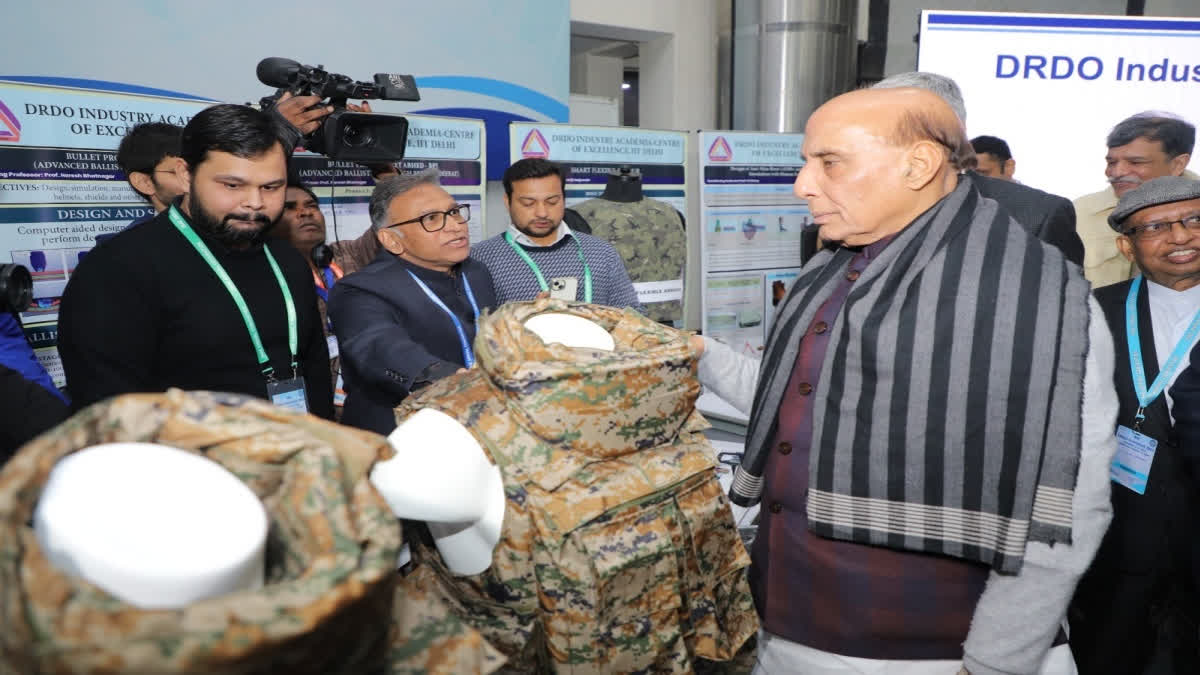New Delhi:In a significant stride toward self-reliance in defence technology, the DRDO Industry Academia-Centre of Excellence (DIA-CoE) at IIT Delhi is spearheading a wave of innovation designed to equip Indian armed forces with cutting-edge indigenous solutions. With a steadfast commitment to enhancing national security, DIA-CoE has been instrumental in addressing critical defence needs through collaborative research involving IIT Delhi, DRDO laboratories, and Indian industries. Defence Minister Rajnath Singh graced the inaugural session.
Dr Samir V Kamat, Secretary of Defence R&D and Chairman of DRDO, highlighted the transformative potential of these initiatives. Speaking exclusively to ETV Bharat, he remarked, “The bullet-proof jackets currently in use by the armed forces weigh over 10.5 kilograms for level-five protection. Through our collaboration with IIT Delhi, we have developed a lightweight jacket that weighs only 8.2 kilograms, saving over two kilograms of weight. This reduction significantly eases the operational burden on soldiers during missions.”
He further emphasised the export potential of such innovations, stating, “Once these jackets are mass-produced, they will not only be cost-competitive but will also outperform global alternatives in terms of weight and protection. This achievement opens up tremendous opportunities for both domestic deployment and international exports.”
A Game-Changer for Soldiers
The lightweight bulletproof jacket, developed as part of DIA-CoE’s projects, is among the most promising breakthroughs. Dr Hemant Chouhan, an associate professor at IIT Delhi and the lead developer of the jacket, shared insights into its design and significance.
“In 2016, the standard bulletproof jackets weighed over 10.4 kilograms. Our new jacket reduces the weight by more than 25%, achieving a weight of 8.2 kilograms,” Dr. Chouhan said. “This was a monumental achievement, but we have continued to innovate. Recently, we developed a sniper-resistant jacket weighing 9.5 kilograms, capable of stopping six sniper rounds, a standard unmatched globally. The Indian Army’s requirements are rigorous, demanding protection against multiple sniper shots, and we have successfully met this challenge.”
The advanced jacket is designed to provide comprehensive protection, including coverage for the throat, groin, and sides, making it ideal for high-risk operations. Rigorous testing by DRDO’s Chandigarh-based lab has validated the jacket’s performance, marking a significant milestone in its journey toward mass production.
Impact on Operational Efficiency
The lighter and more advanced jackets are expected to significantly enhance soldiers’ mobility and endurance, particularly in extreme terrains and combat scenarios. By reducing the physical strain on personnel, these innovations align with the evolving demands of modern warfare, where agility and speed are critical.
Dr Chouhan elaborated, “The weight reduction directly translates to increased operational efficiency for our soldiers. Carrying a lighter jacket allows them to focus more on the mission and less on the equipment burden. Moreover, the indigenous development ensures that these products are tailored to the specific needs of the Indian Army.”
Expanding the Scope of Indigenous Defence Technology
The bulletproof jacket is just one of many groundbreaking projects under DIA-CoE’s umbrella. With over 30 active projects addressing various defence needs, the centre is making strides in areas such as Smart Soldier Jackets: Integrated with advanced sensors for real-time monitoring.
Terahertz Technology: For the spectroscopy and imaging of energetic materials.
Technology Transfer and Industrial Collaboration
